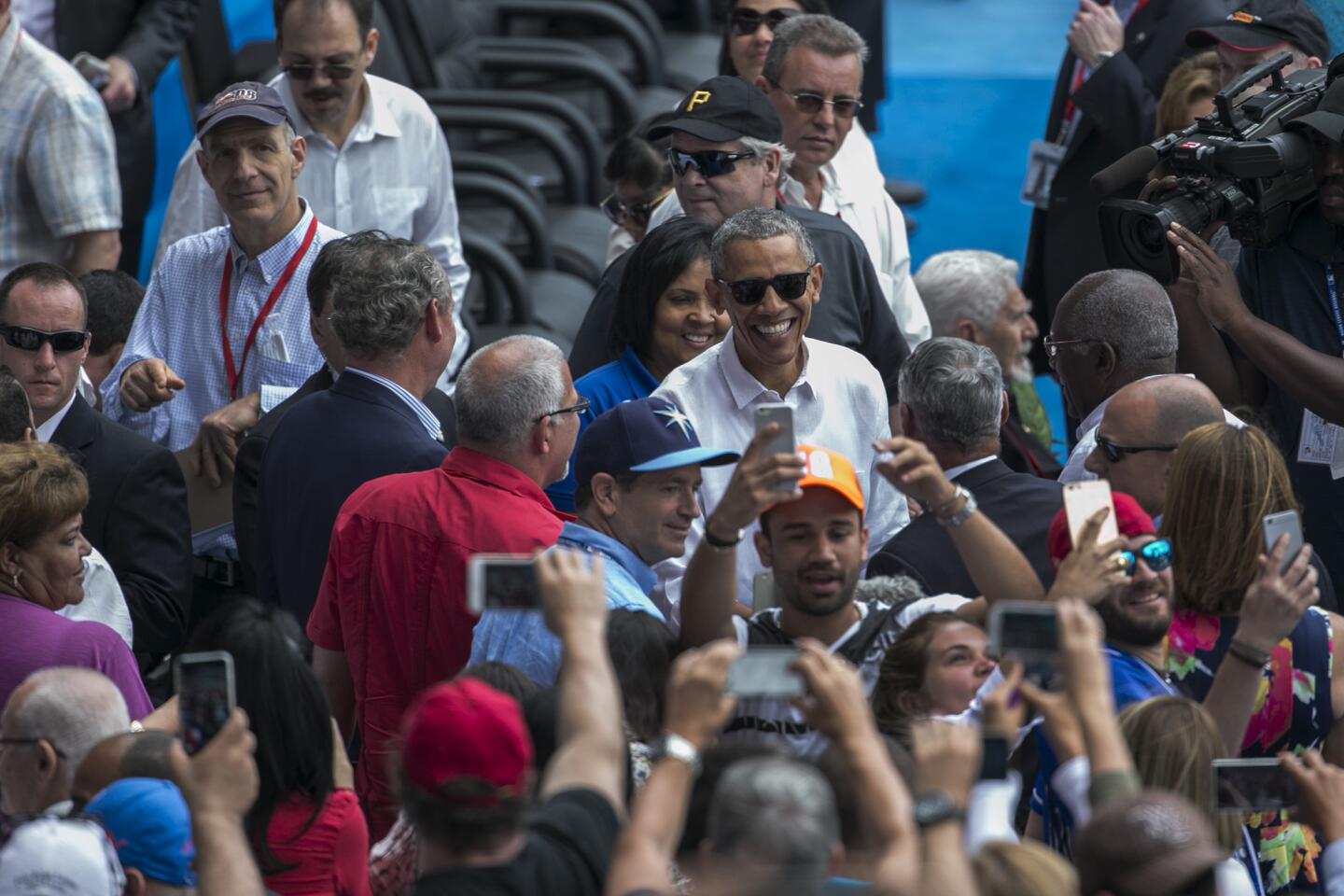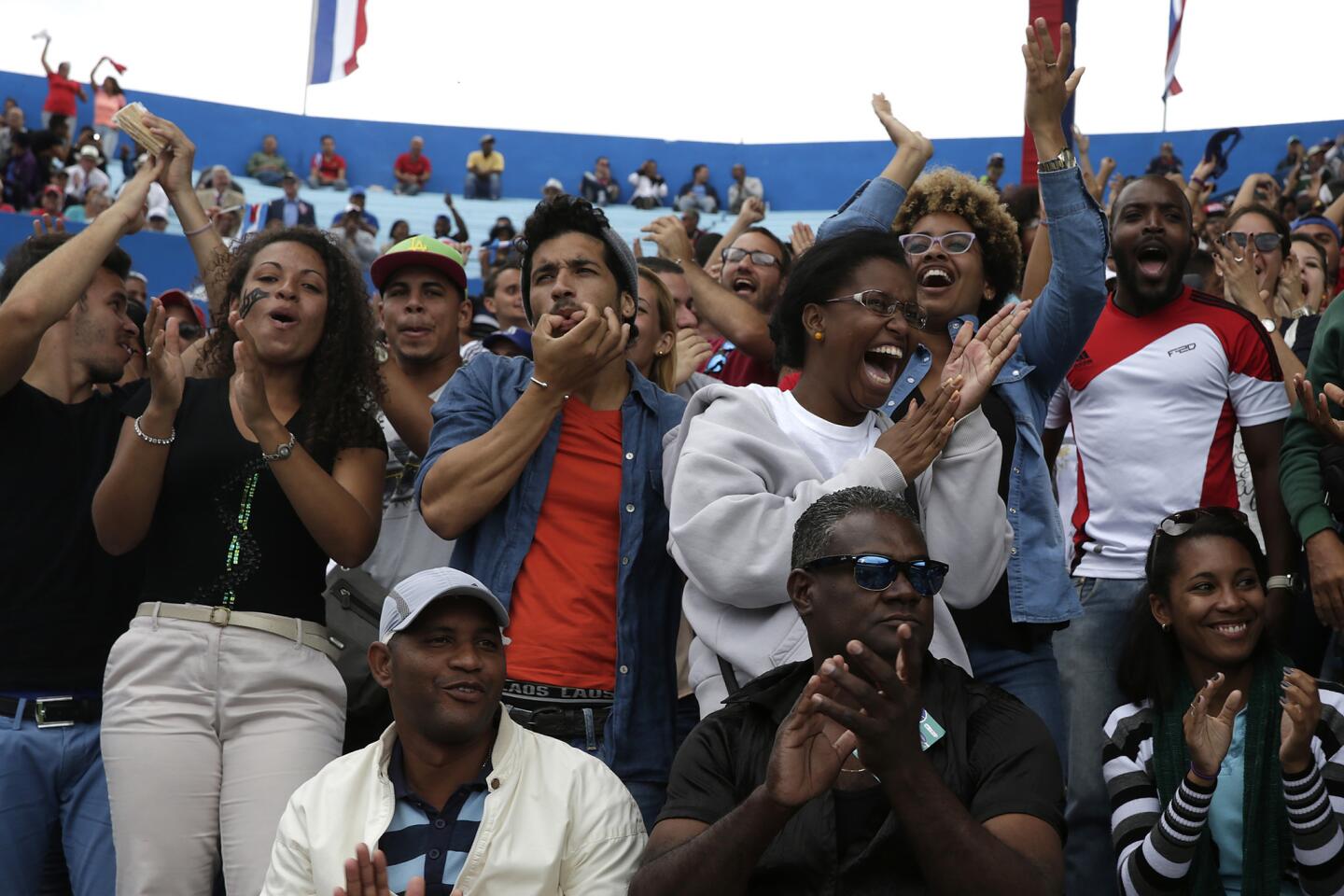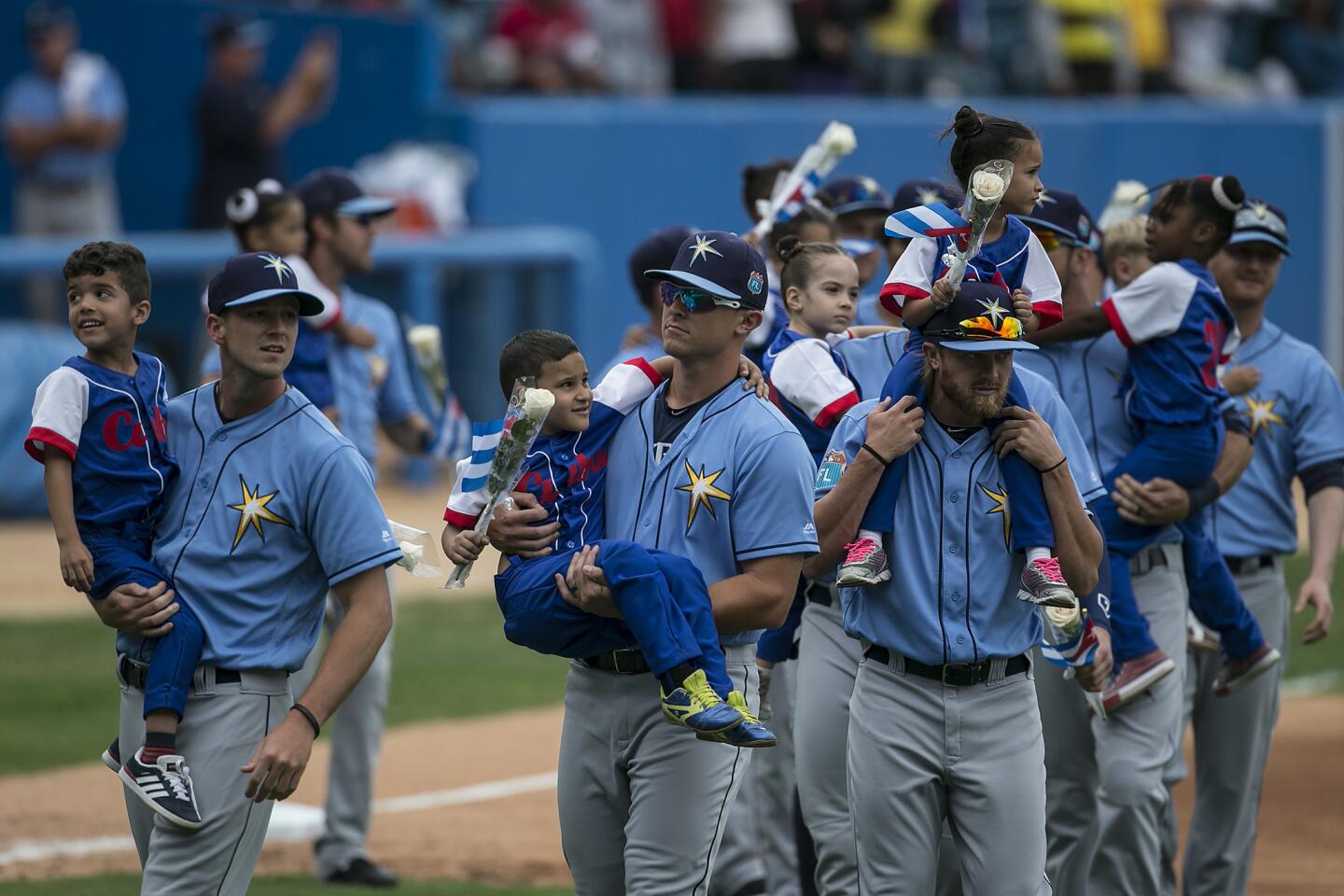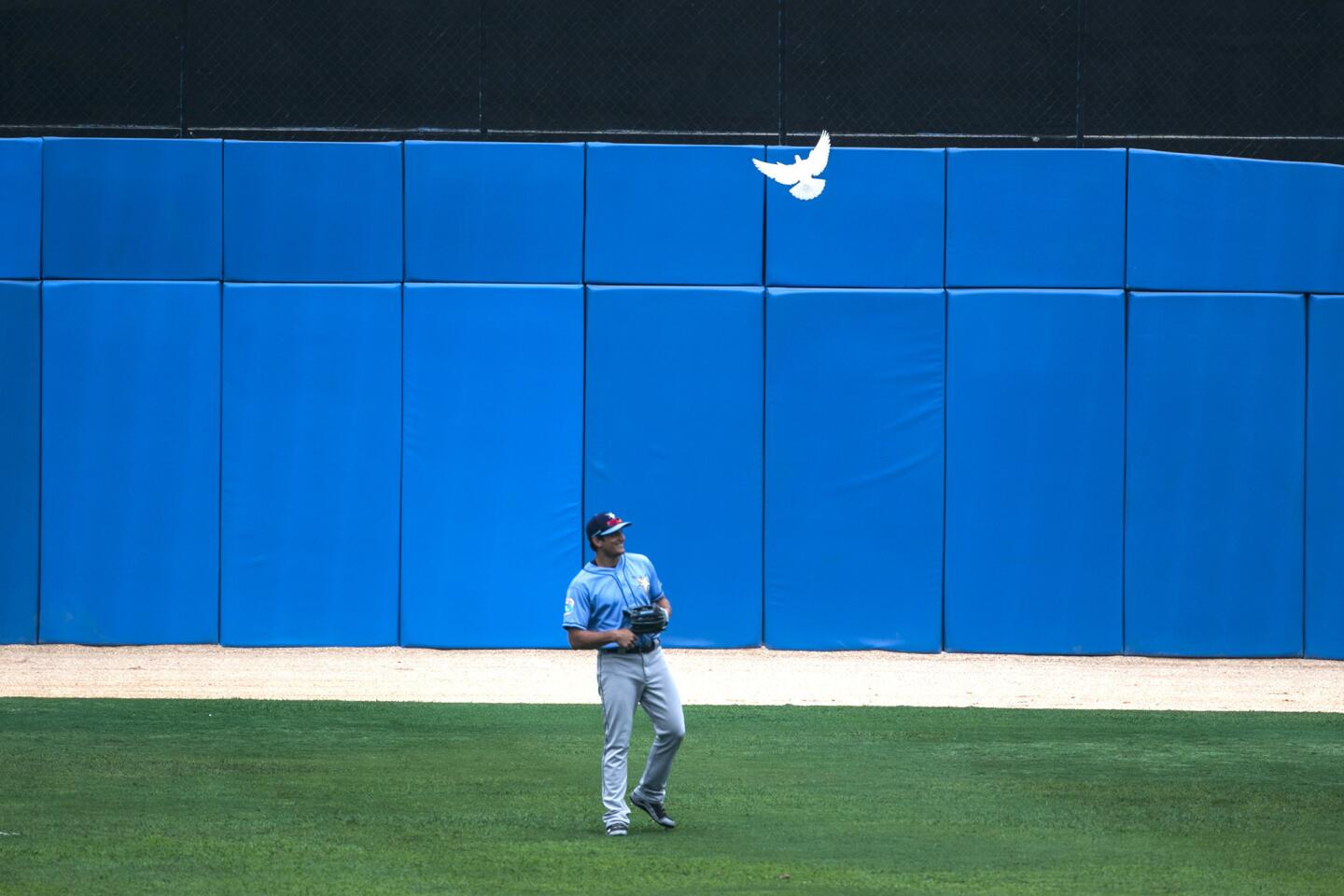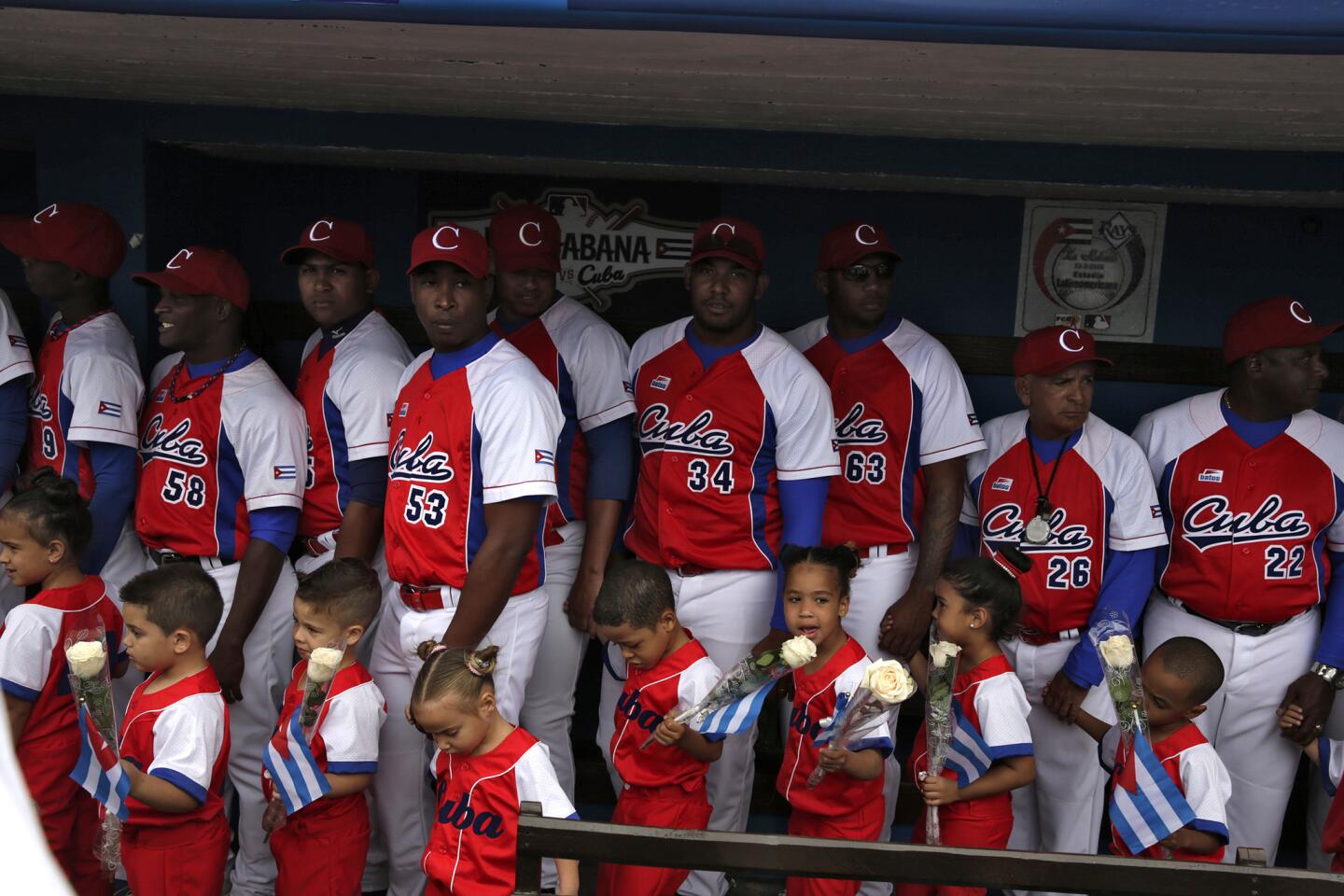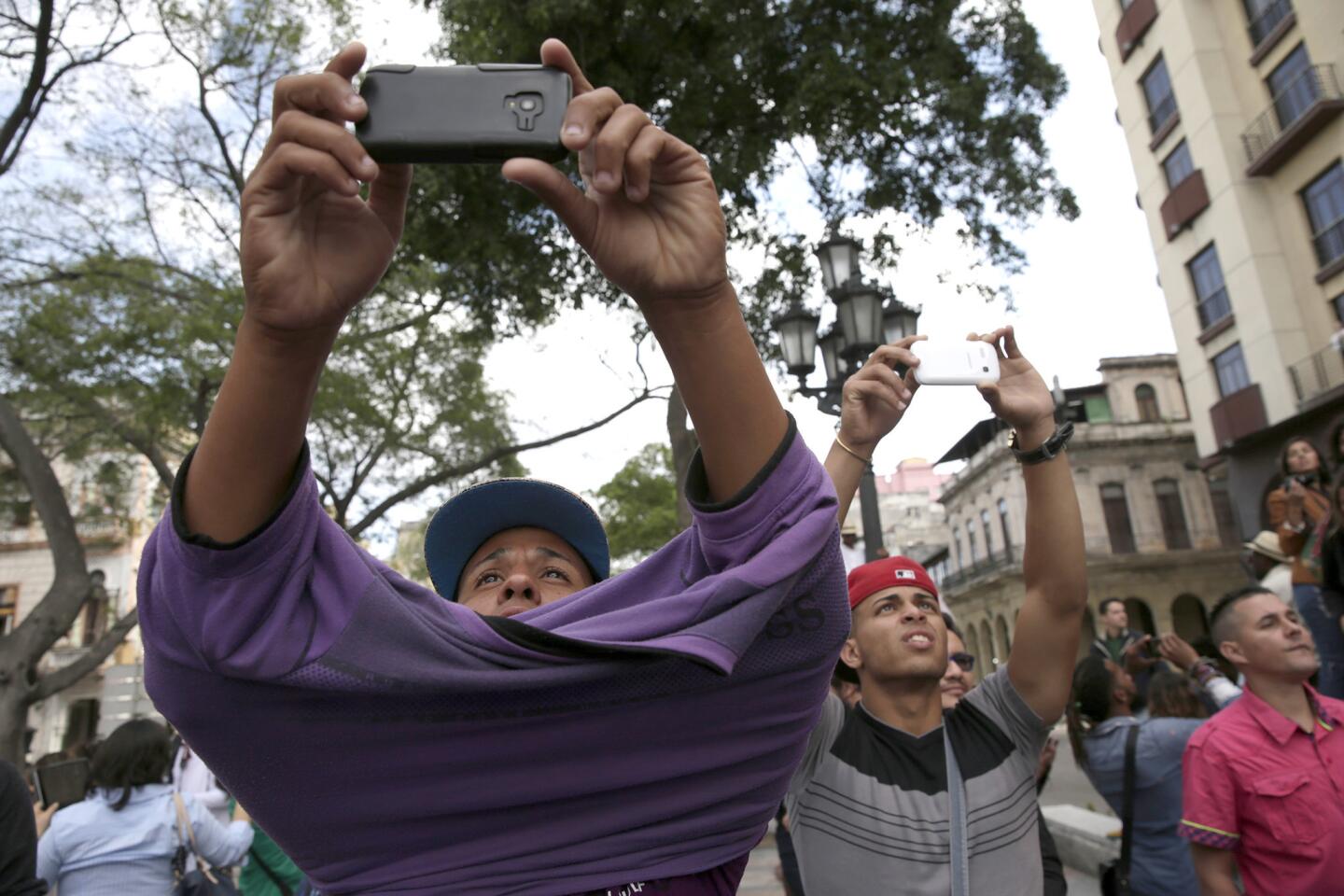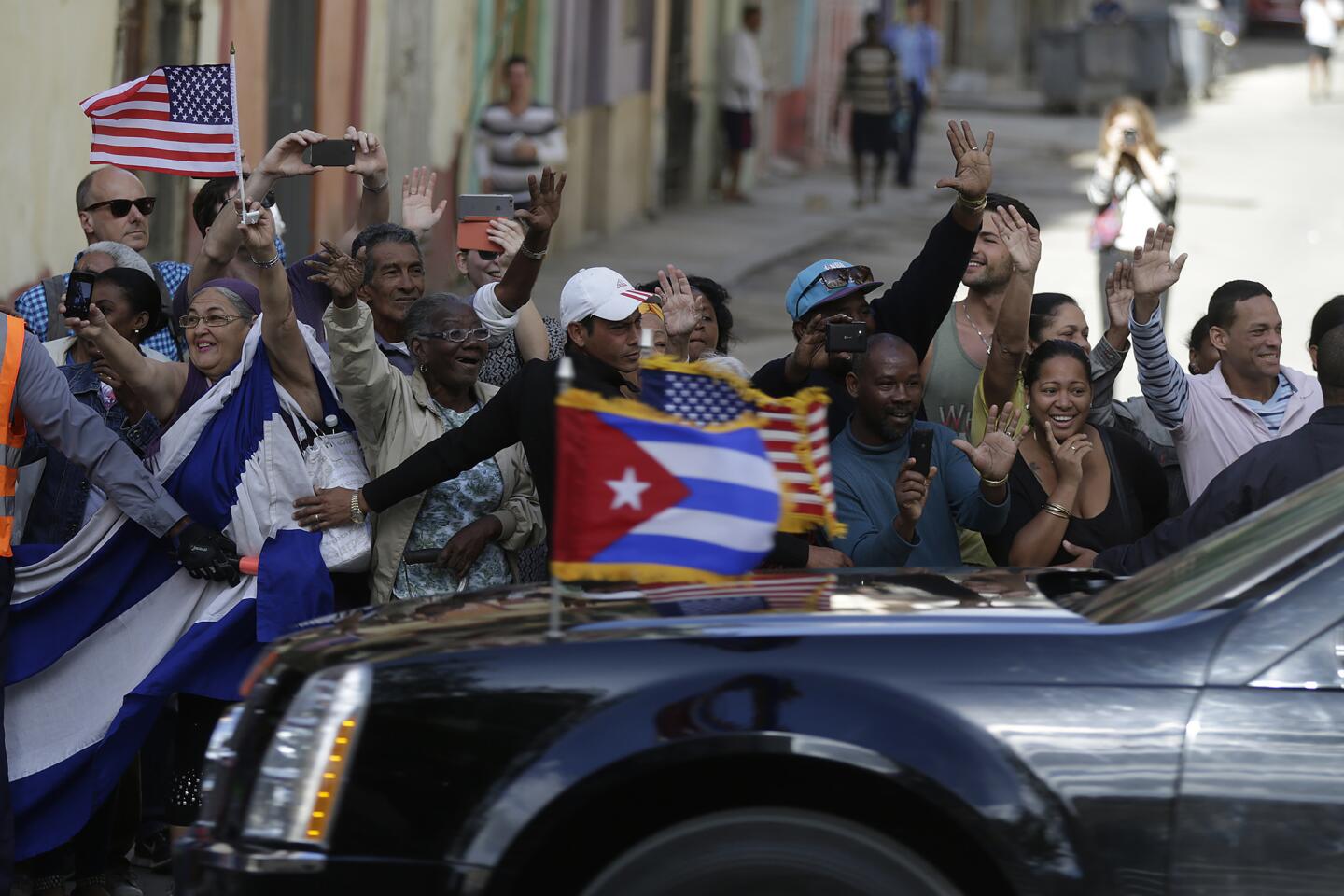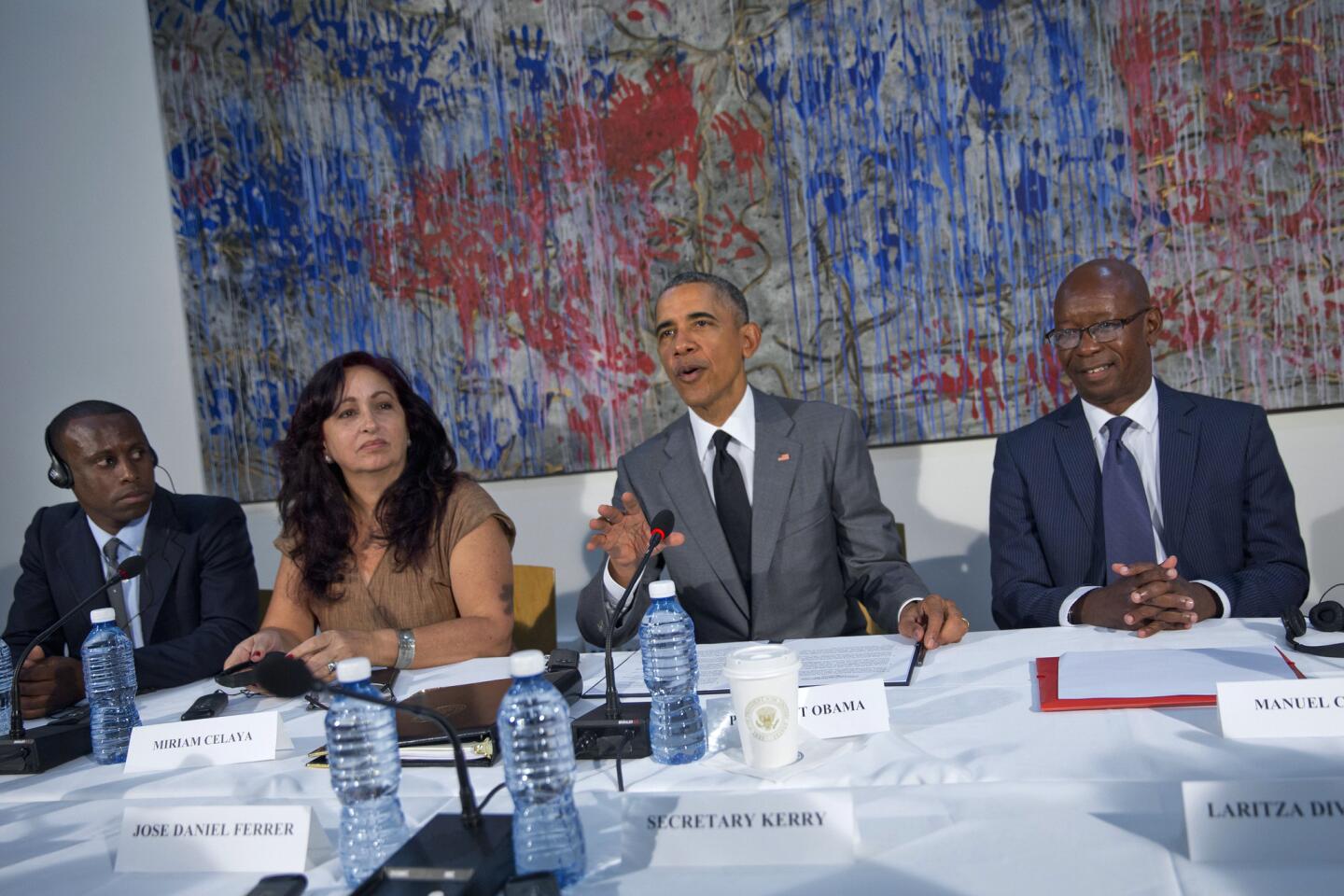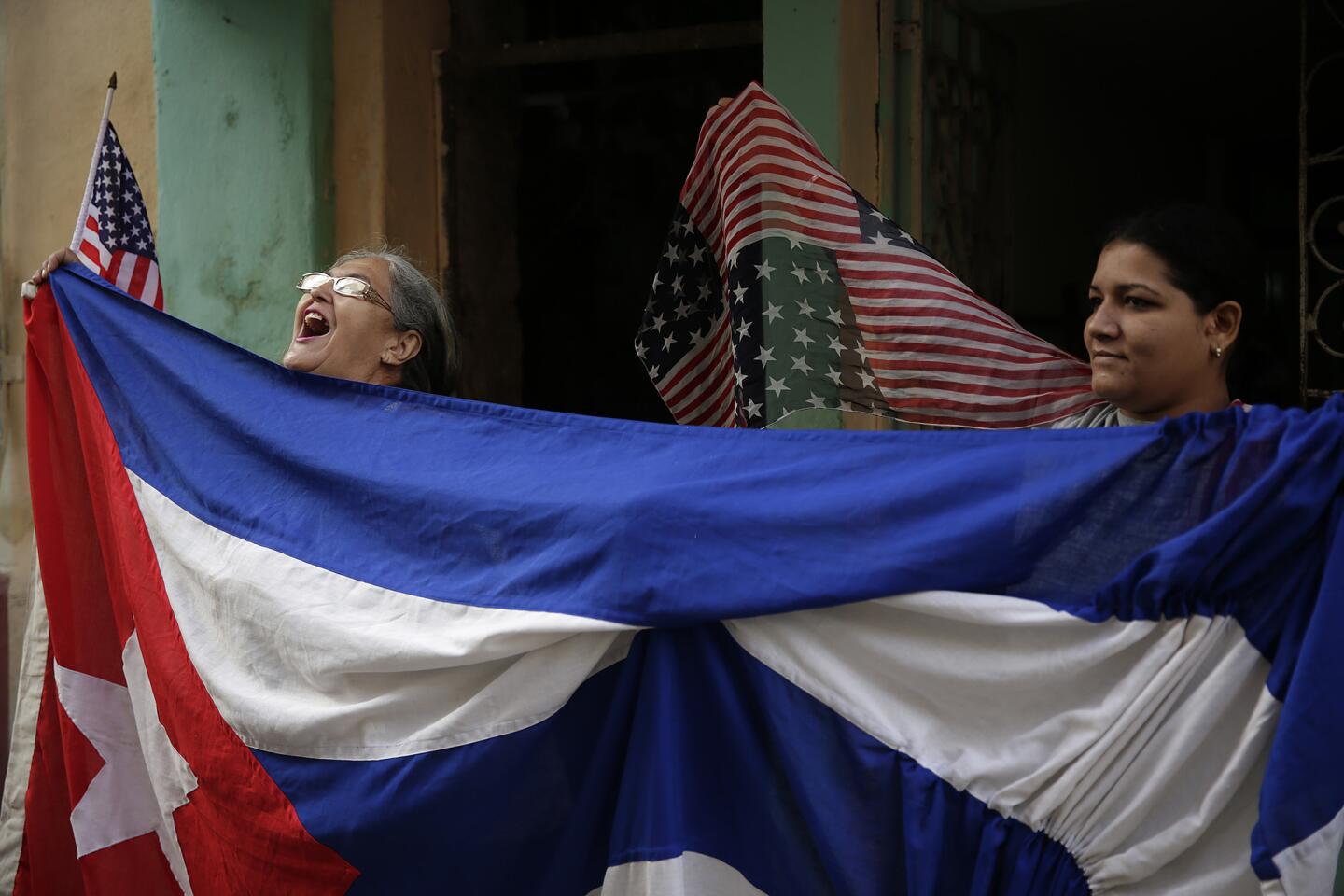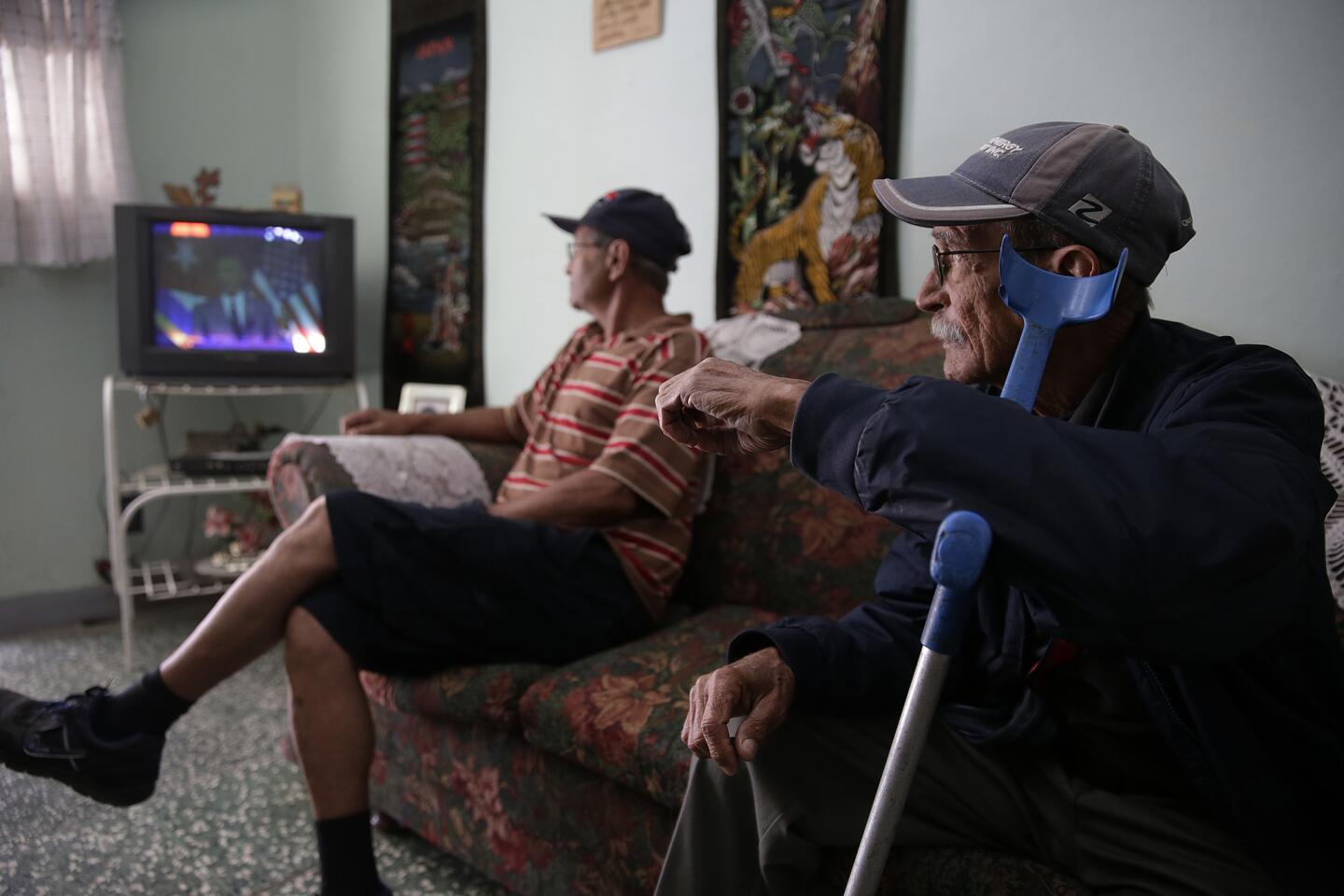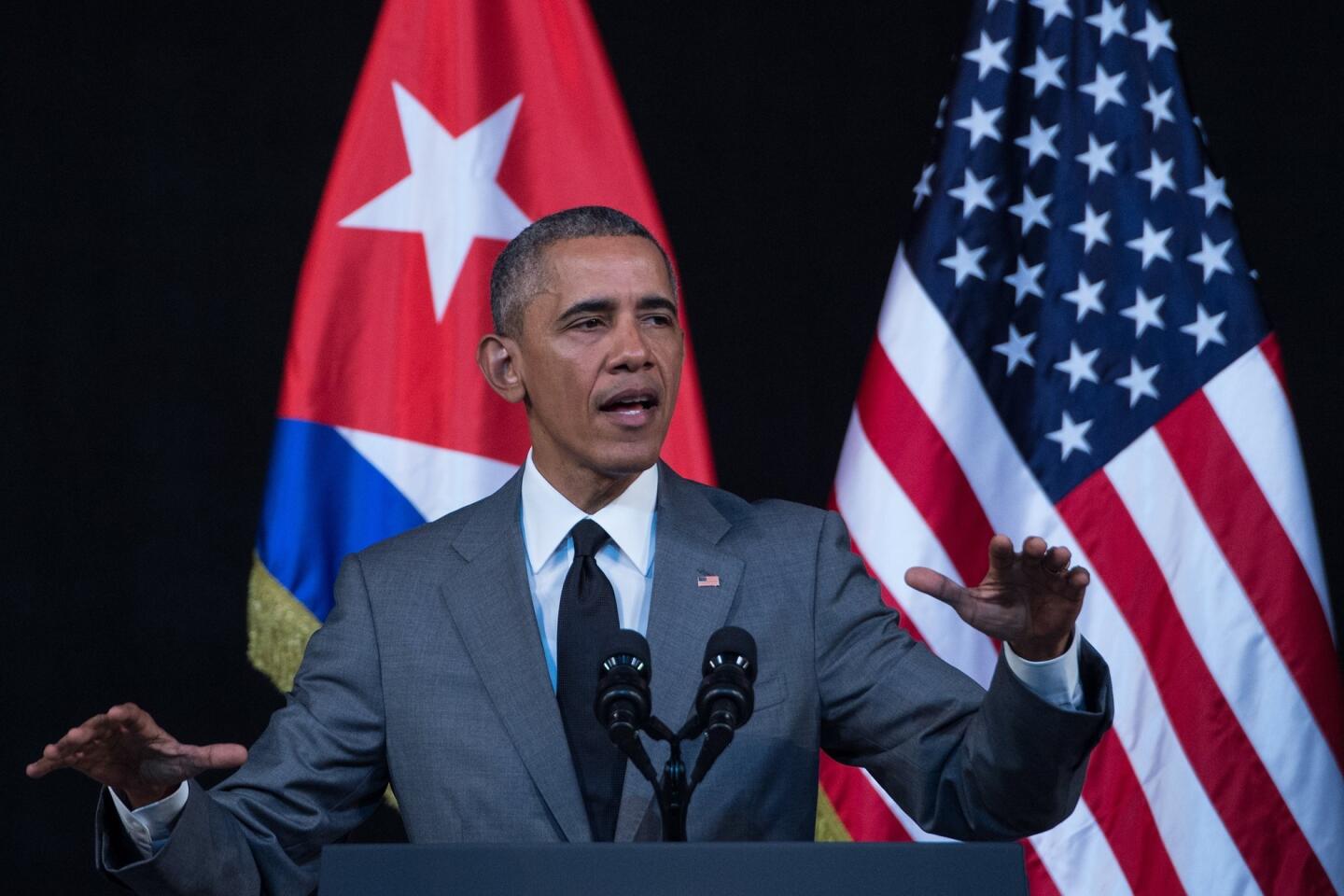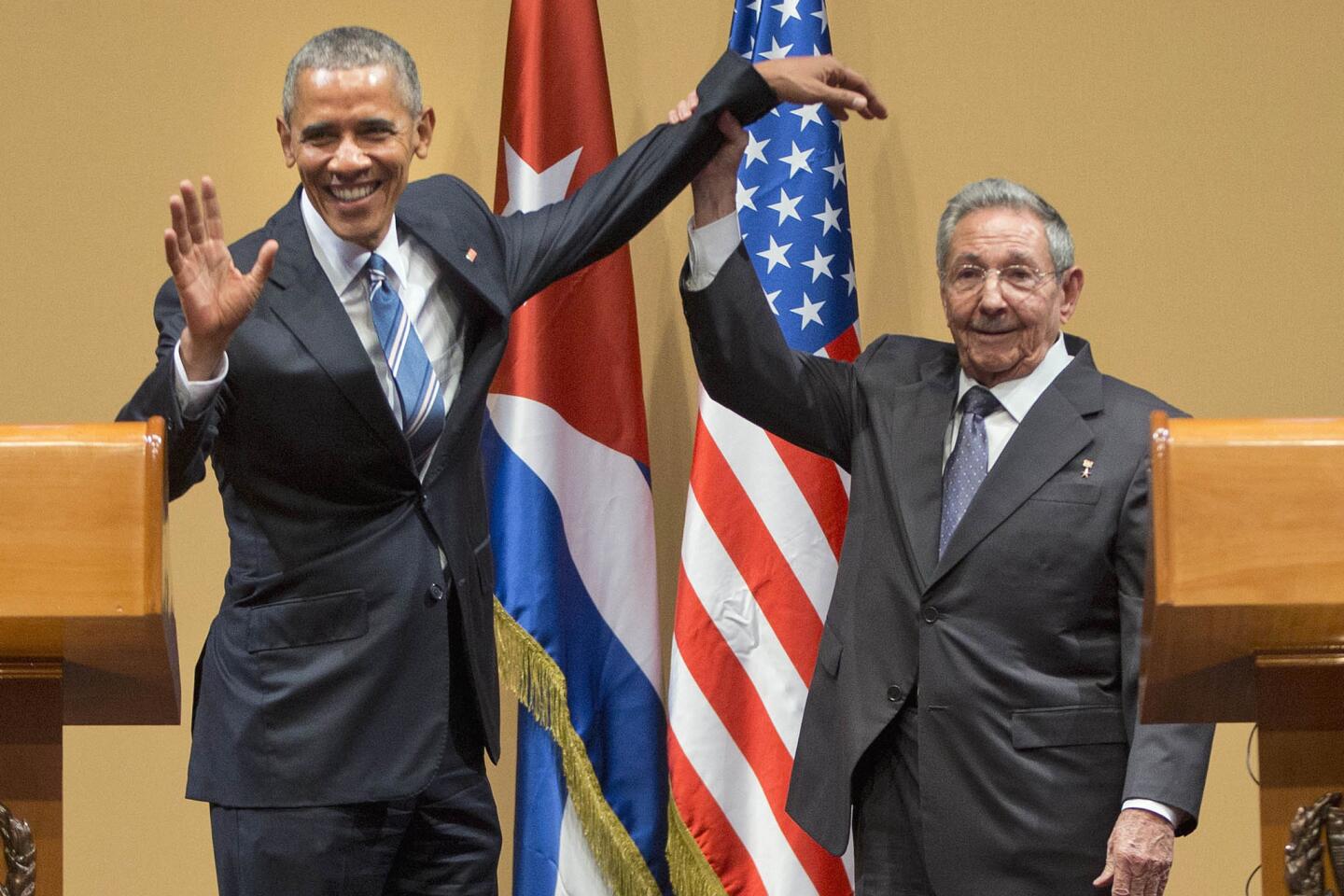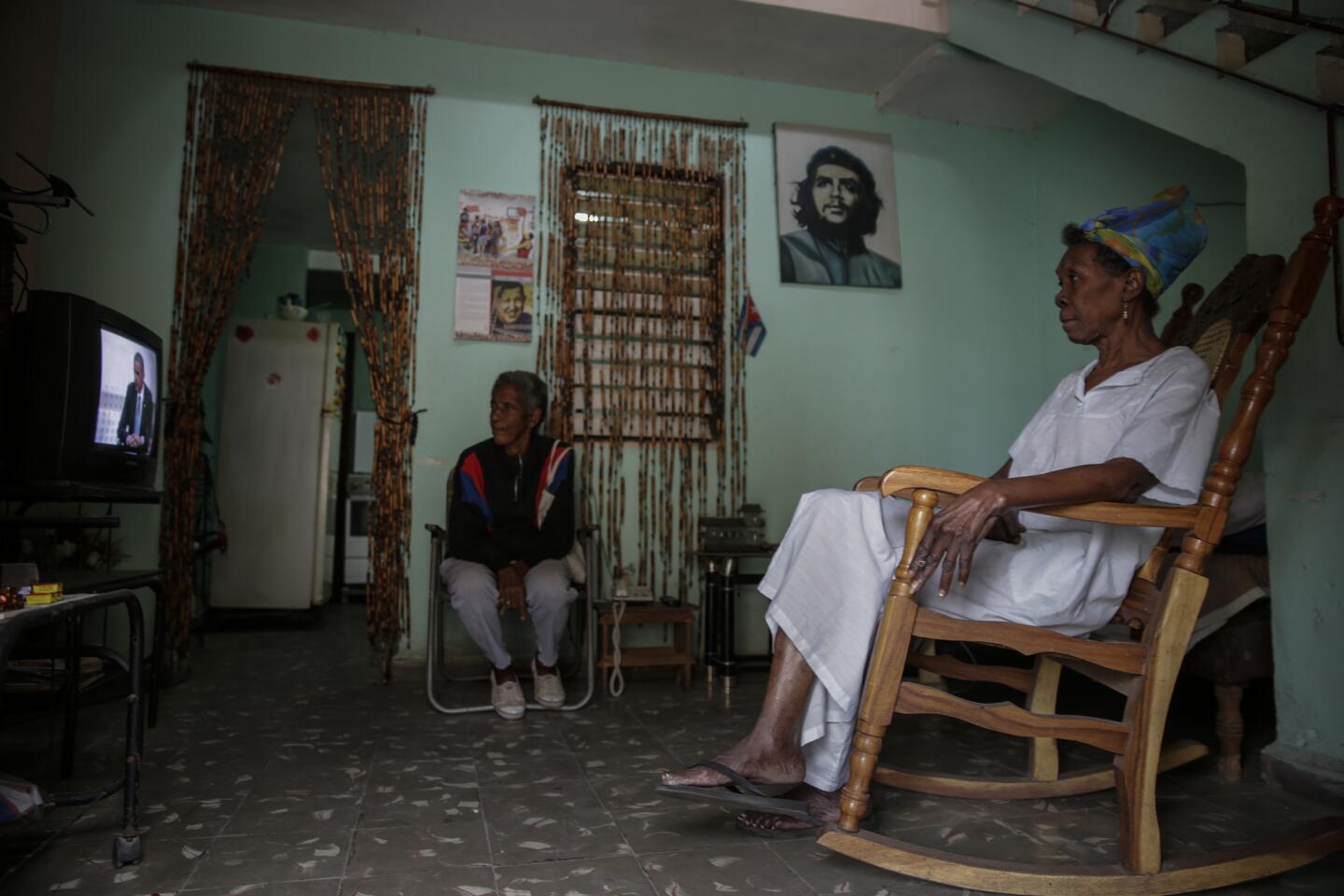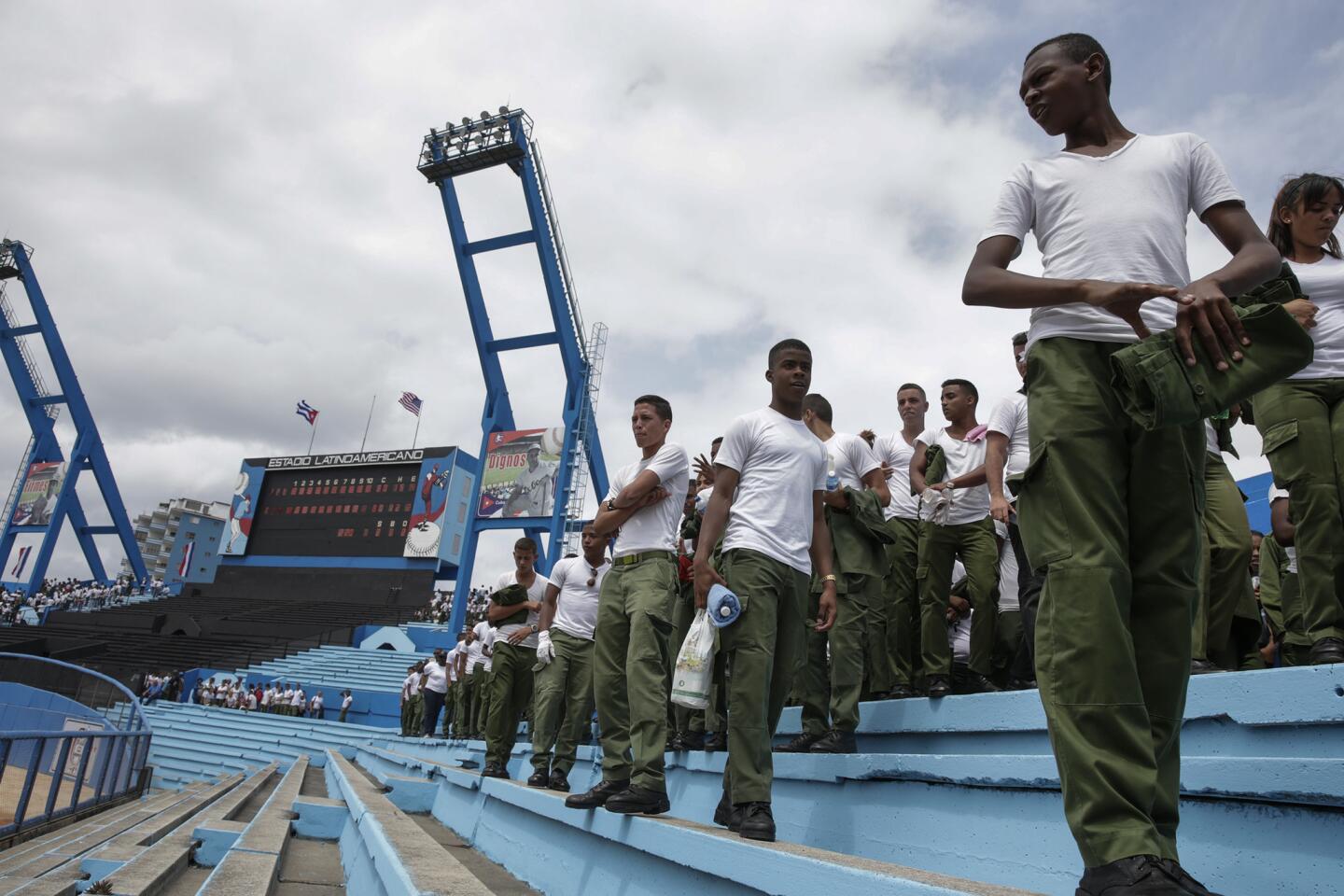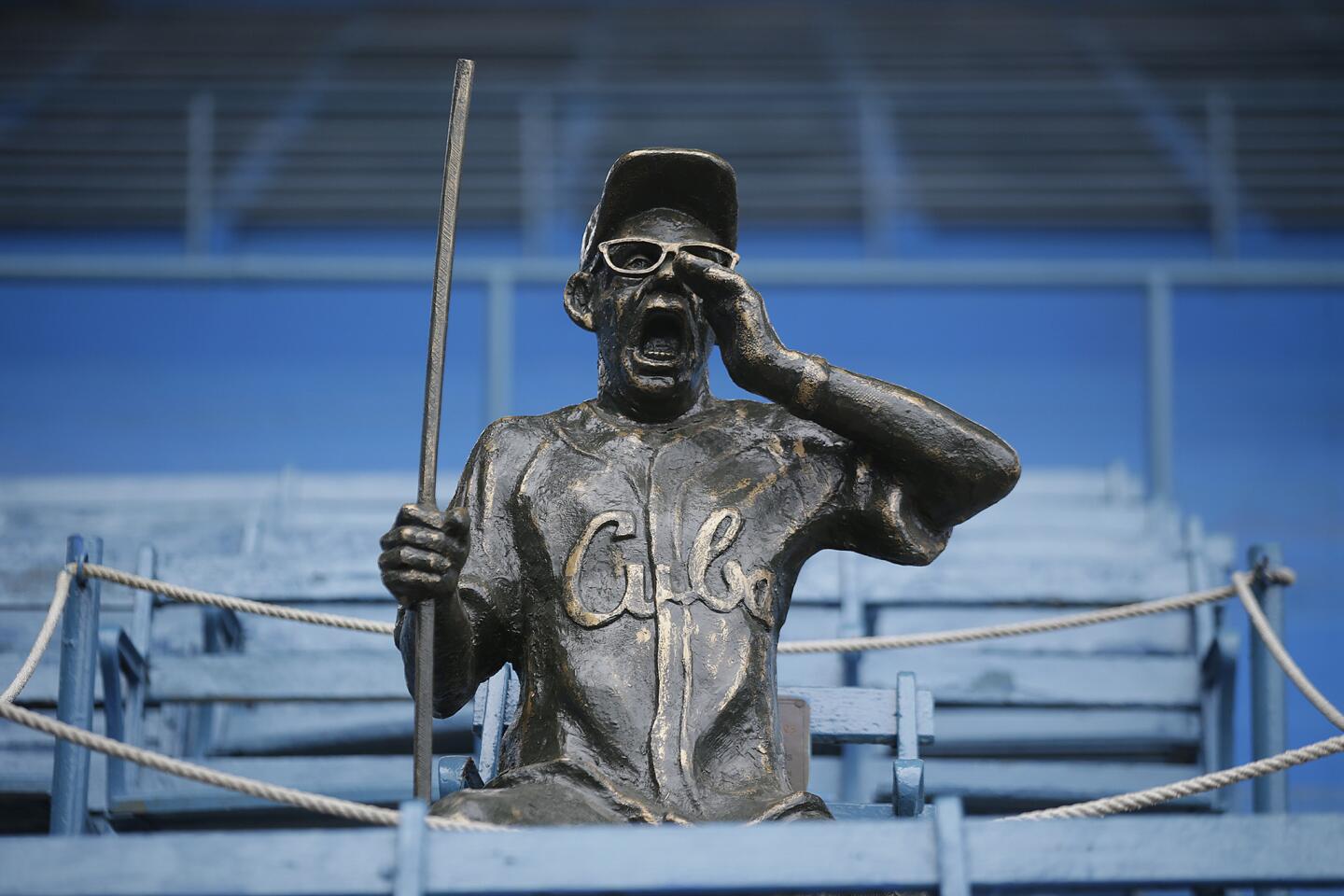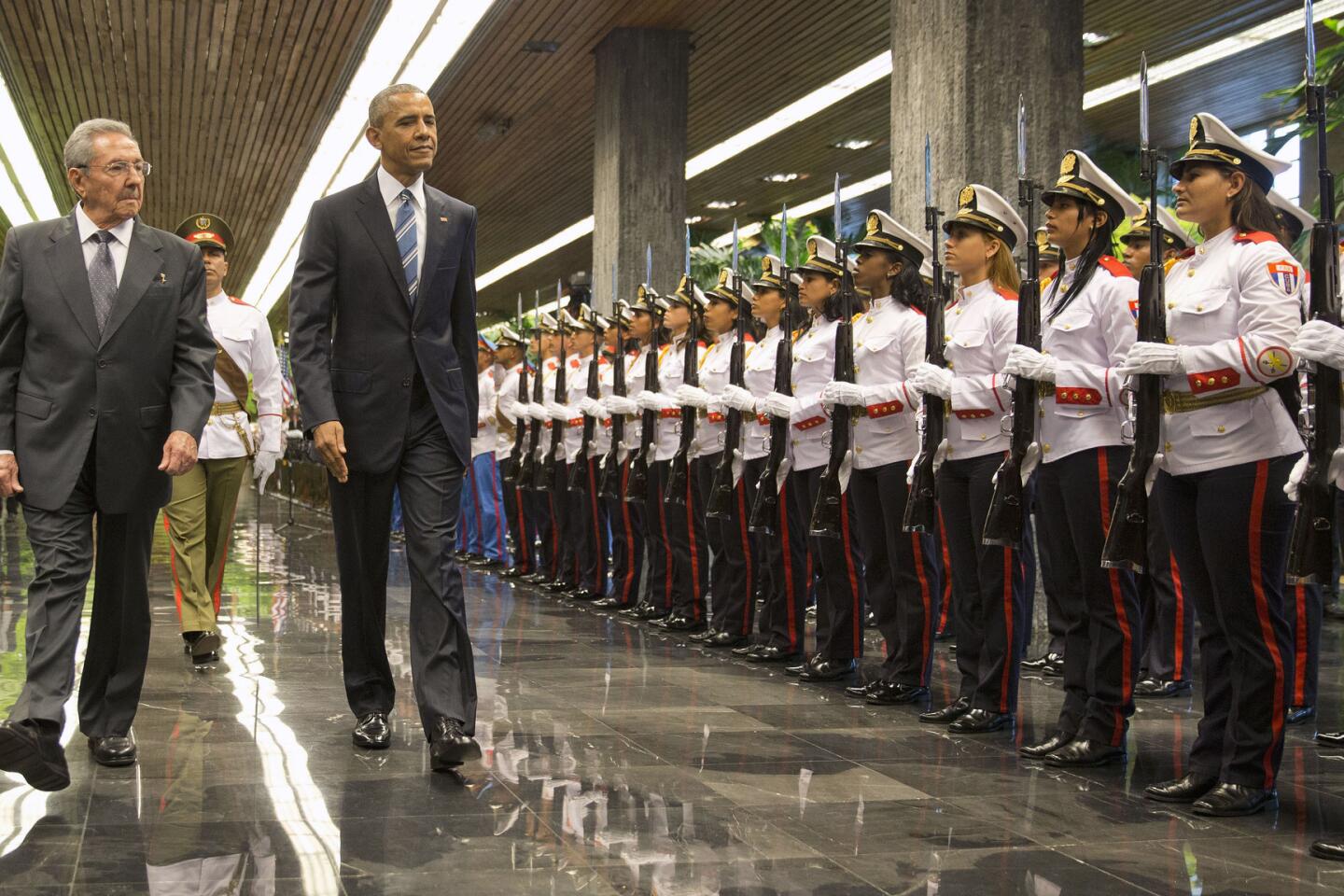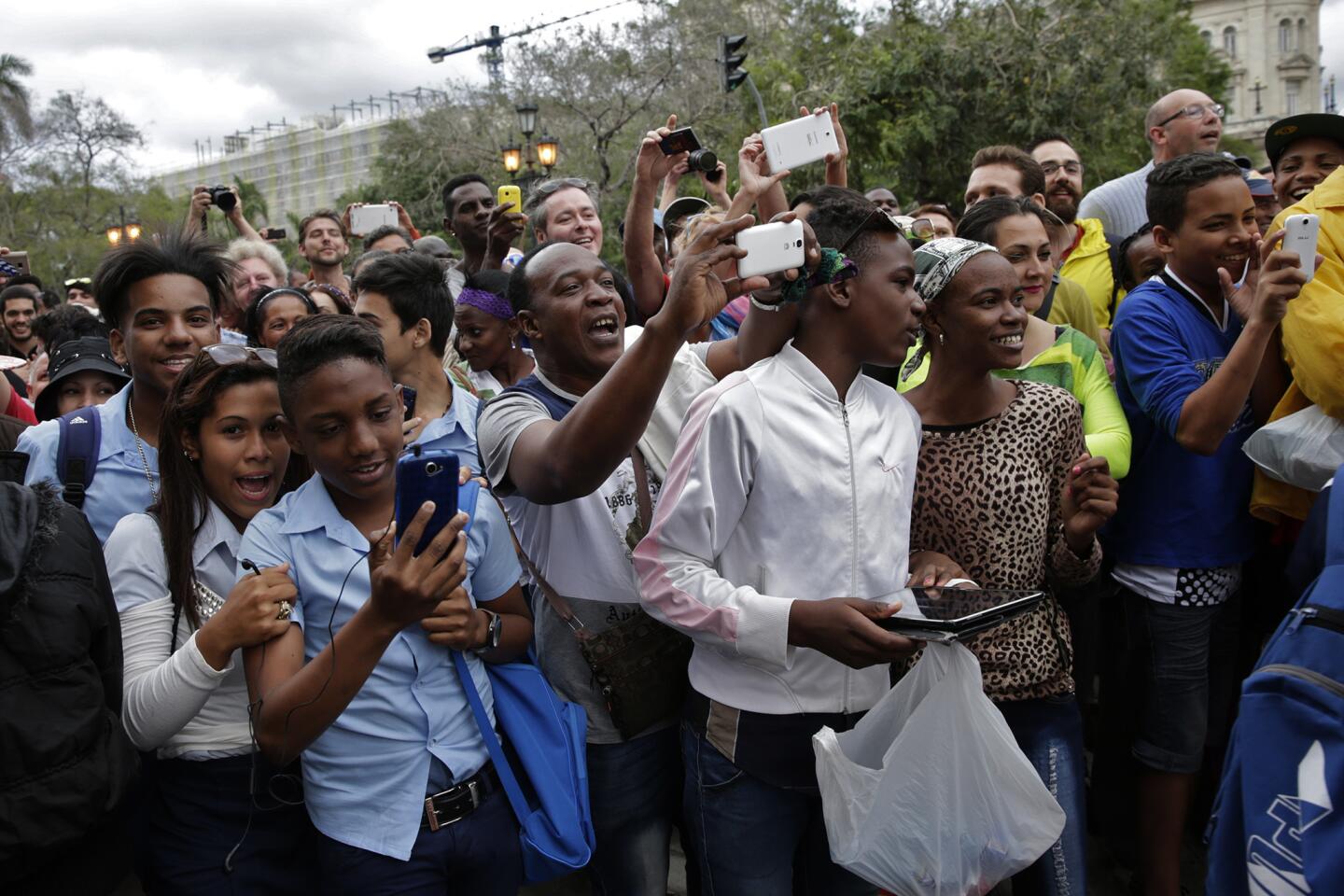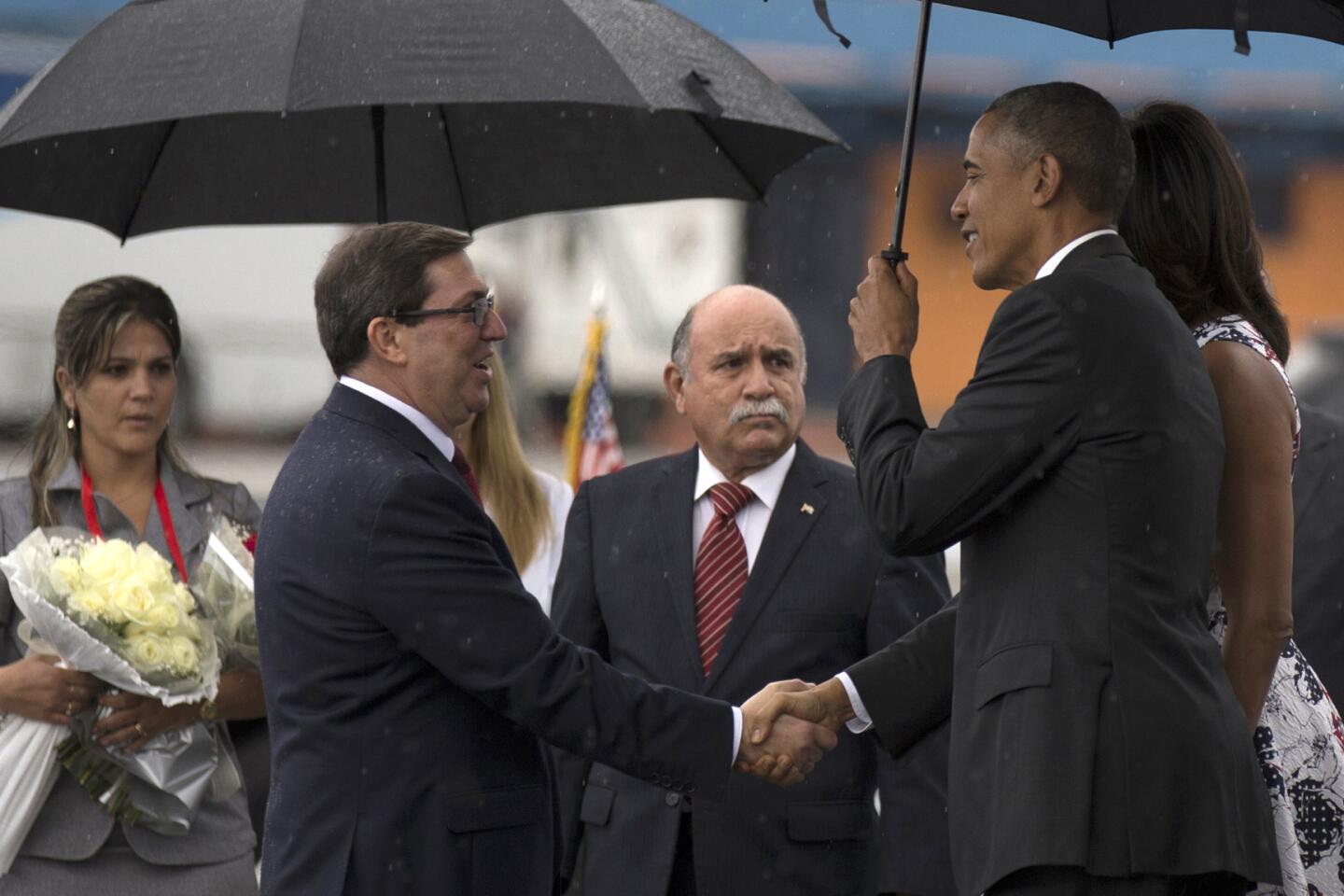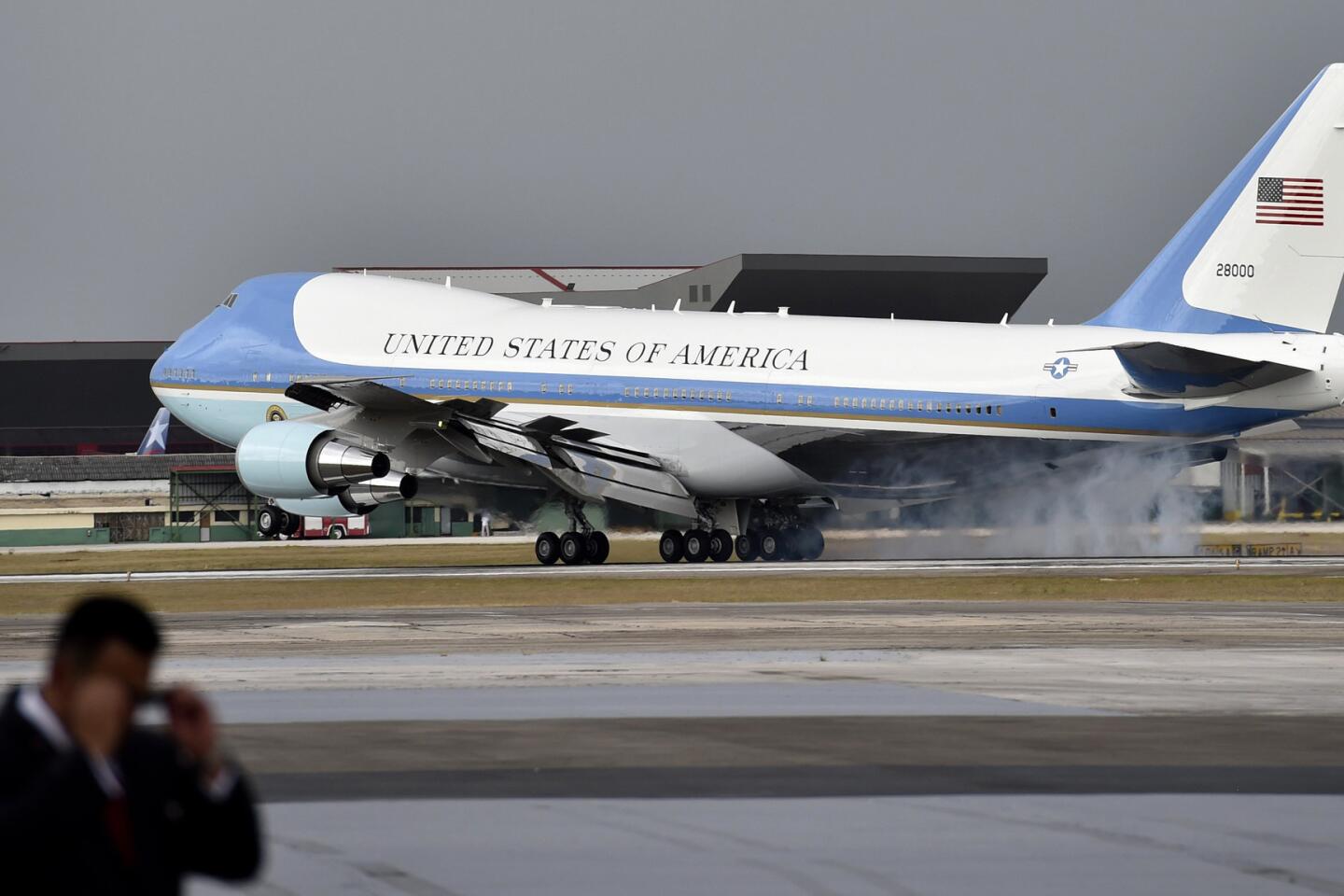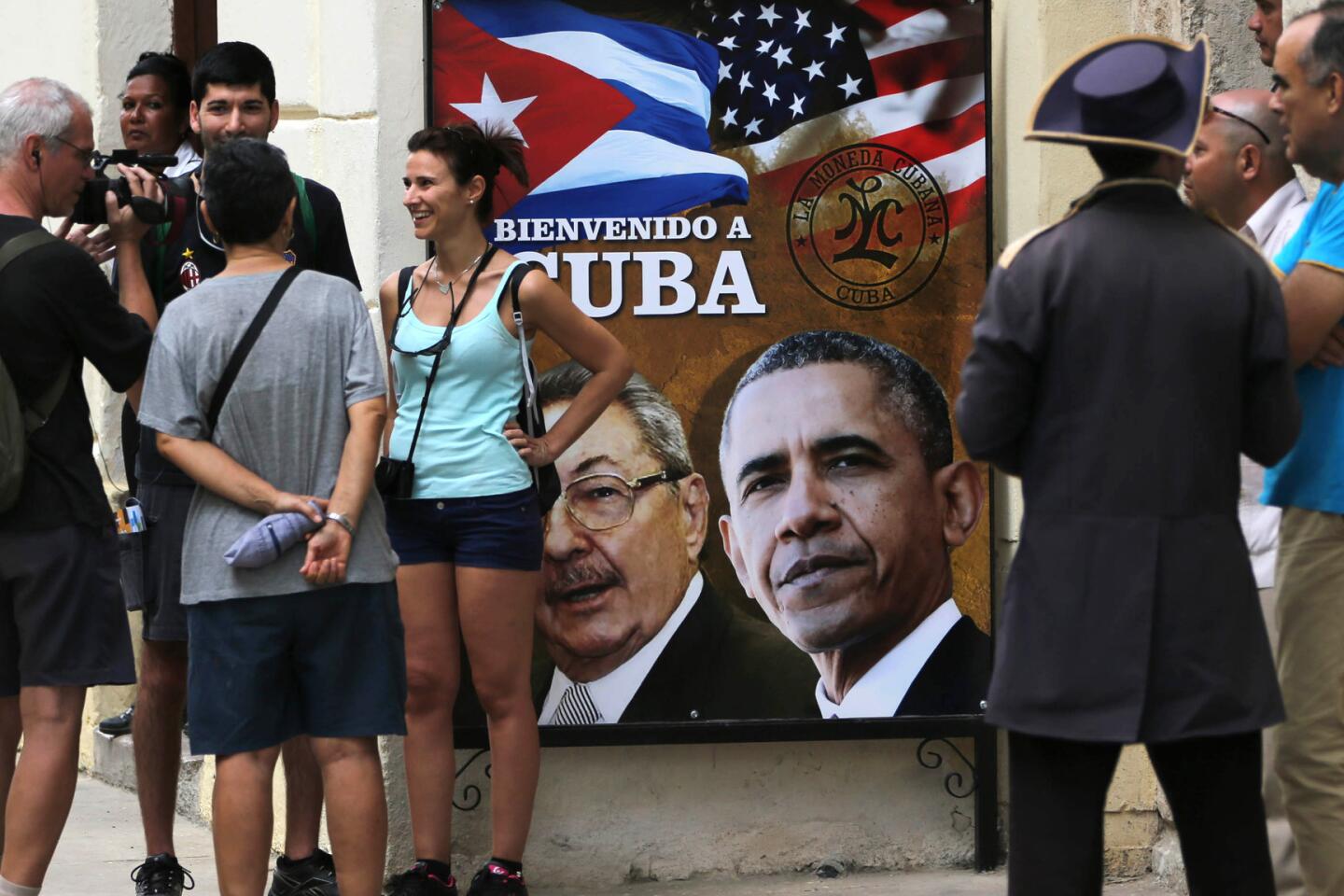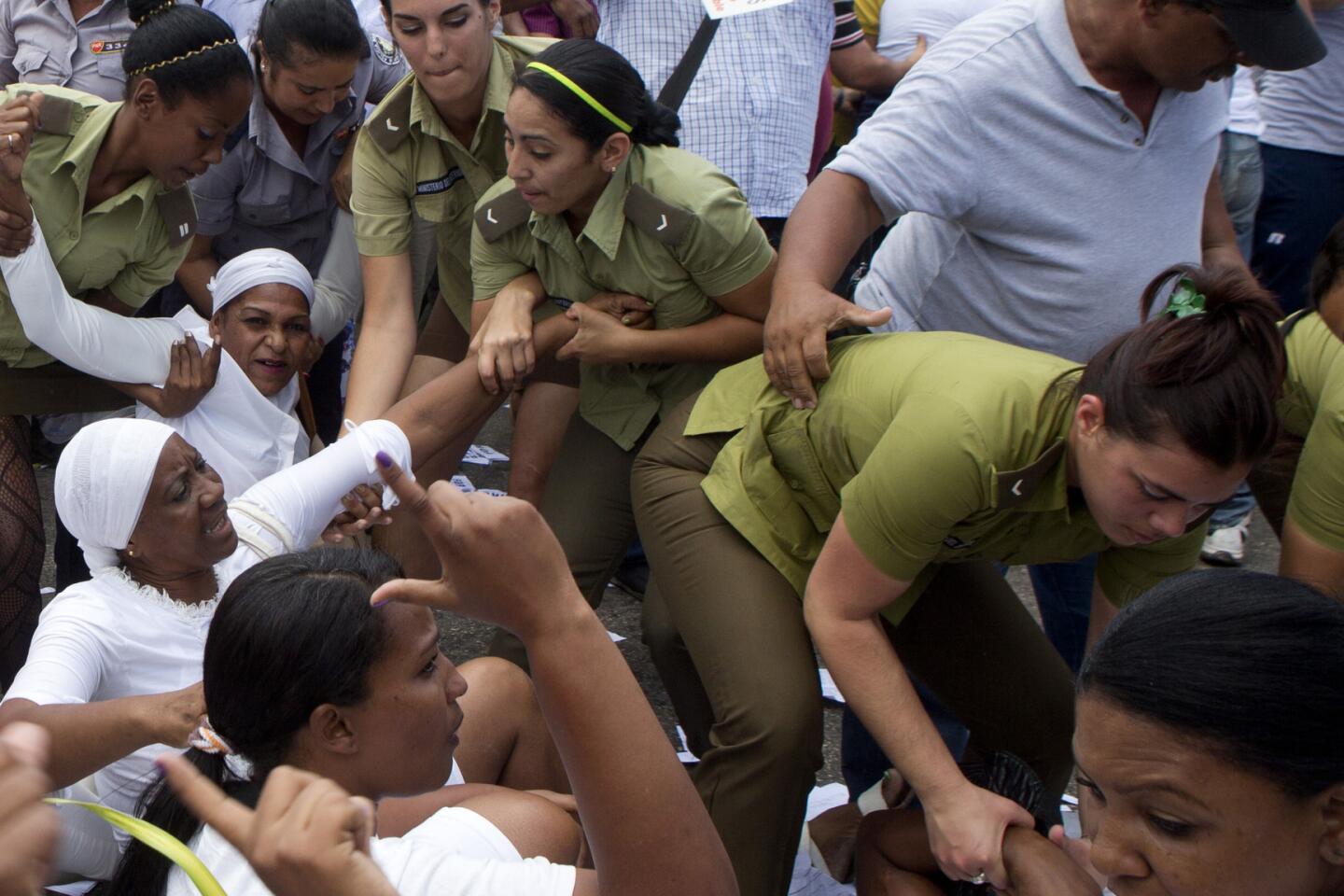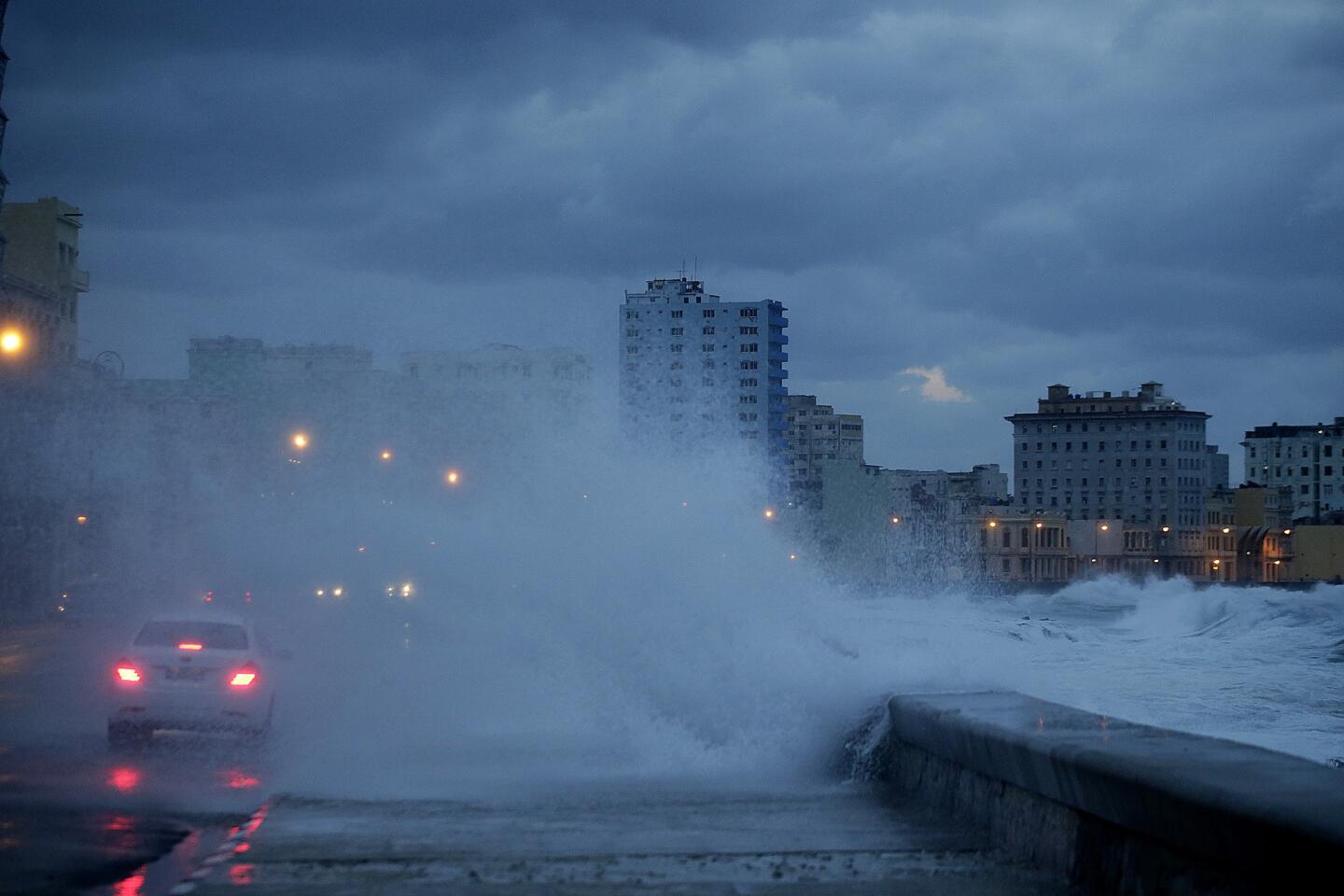Obama and Castro, side by side, both speak of human rights but sound discordant notes
- Share via
Reporting from Havana — Saying he hoped to bury a last vestige of the Cold War, President Obama held a historic meeting with Cuban President Raul Castro on Monday but acknowledged that issues of human rights and democracy remained “a powerful irritant” blocking better relations between the two countries.
On a day when the U.S. flag repeatedly appeared alongside potent symbols of the Cuban Revolution, Obama insisted that engagement with Cuba after half a century of hostility was the only way to improve the plight of Cubans and promote reconciliation while also opening the island to U.S. investment and travel.
Obama’s visit to the communist-ruled country, the first by a sitting U.S. president since 1928, marked the culmination of the administration’s rapprochement with its erstwhile bitter enemy. On Tuesday, before continuing to Argentina, Obama will deliver a speech on national Cuban television, meet with dissidents and, with Castro, attend an exhibition baseball game between the Tampa Bay Rays and Cuba’s national team.
Both governments say they want to start a new chapter in their countries’ relations, but not all tensions could be glossed over.
“As we do wherever we go around the world, I made it clear that the United States will continue to speak up on behalf of democracy,” Obama said. “We’ll speak out on behalf of universal human rights, including freedom of speech and assembly and religion.”
Obama and Castro disagreed publicly over the very definition of human rights. Castro chided the U.S. failure to provide universal healthcare or equal pay, which he considers to be human rights. Obama held firm but also sought not to appear interventionist.
“Cuba’s destiny will not be decided by the United States or any other nation,” he said, adding that his talks with Castro had been frank, candid and constructive.
The comments came after the two leaders met at length in private and delivered remarks before agreeing to take questions from among the hundreds of journalists in Havana to cover Obama’s visit. It is rare for Castro to answer reporters’ questions in such settings, and what followed was quite a spectacle.
Castro bristled when an American reporter asked whether he was willing to release political prisoners. First he pretended his headphones with the translation weren’t working. Then he countered that Cuba doesn’t have political prisoners.
“Show me a list.… Tell me a name,” Castro retorted. “If you can show me one, I’ll release them tonight.”
Human rights activists quickly took to social media to provide such lists.
Castro then lectured another American reporter on the meaning of human rights before abruptly declaring an end to the news conference.
Both Obama and Castro acknowledged they were far apart on political issues, although they listed numerous areas of accord, including ocean conservation, drug interdiction and fledgling commercial projects.
Castro also used his remarks to demand the U.S. return the Guantanamo naval base, located at one end of the island, and end its economic embargo against Cuba.
Obama has issued several executive orders to chip away at the embargo, but only an act of Congress can end it.
“The embargo is going to end,” Obama said. “When, I can’t be entirely sure. And the path we are on will continue beyond my administration.”
For his part, Castro did not address a question about the arrest of dozens of dissidents hours before Obama’s arrival Sunday. Most were from the Ladies in White, a group of wives and daughters of political prisoners who demonstrate against the Castro government every Sunday. Obama said he still hoped to meet with representatives of dissident groups and other members of civil society.
In the welcoming ceremony Monday morning, Obama placed a wreath of red, white and blue roses at an imposing monument honoring Cuban independence hero Jose Marti, who is revered throughout the hemisphere.
“It is a great honor to pay tribute to Jose Marti, who gave his life for independence of his homeland,” Obama inscribed in a visitors’ book. “His passion for liberty, freedom, and self-determination lives on in the Cuban people today.” Obama was greeted by Salvador Valdes Mesa, a member of the Communist Party politburo and storied fighter in the revolution and in repelling the U.S.-backed Bay of Pigs attack in 1961 — the year of Obama’s birth.
The director of the museum that faces the monument, Aide Diaz Ortega, 96, spoke to Obama about Marti and told the president it was “muy amable” (“very kind”) of him to visit.
Then, at the Palace of the Revolution, past huge portraits of revolutionary commanders Ernesto “Che” Guevara and Camilo Cienfuegos, and the slogan “Hasta la victoria siempre” (“Until victory, always”) Obama met Castro, they shook hands and then reviewed a line of military service members in dress uniform presenting arms.
Hundreds of Cubans lined the streets to watch the president’s motorcade pass, waving and calling out. Several Cubans have said they were instructed to not shout anti-U.S. slogans.
Later Monday, Obama oversaw a gathering of budding Cuban entrepreneurs and American and Cuban American businesspeople to underscore the role the administration sees for economic improvement as a catalyst for political change.
“I’m here today to say that America wants to be your partner,” Obama told the group.
Political reforms are slow in the communist system, where detention and harassment of activists persist amid U.S. pressure for greater freedom. And Cuban authorities remain adamant about changing at their own pace.
Since the U.S. and Cuba announced detente in December 2014, Obama’s critics have questioned whether the prisoner releases announced at the same time would be the only such gesture from the Cuban side. Four of the prisoners released then were even rearrested.
Many Republican and Cuban American members of Congress are dismayed that Obama would meet with the head of the authoritarian government at all, given its grave abuses of power.
Obama has faced similar criticism before as he sought to expand diplomatic relations with China, Myanmar and Iran.
But at the heart of Obama’s foreign policy doctrine is a conviction that the U.S. must find ways to engage with even the harshest of regimes, partly because it is the only way to export American beliefs about justice and liberty.
The White House also strongly believes that if Cubans gain more spending power, they can loosen the government’s hold and improve their own lives with goods and services such as telecommunications access. And it doesn’t hurt to open a new consumer market to U.S. businesses that’s just 90 miles offshore.
Mom-and-pop businesses, including restaurants, beauty parlors and car washes, have sprouted up all over Havana since Castro began allowing a measure of private enterprise. Obama took his family to dinner Sunday at San Cristobal, one of the so-called paladars, privately owned restaurants that are key to Cuba’s emerging private sector.
Freedom follows commerce, as supporters of Obama’s view see it; economic improvements can open Cuban society. For evidence, they point to the changes in motion, including Starwood Hotels and Resorts’ announcement that it will build in Cuba, the first U.S. company to do so in 60 years.
“Each time a new hotel opens, you have a new lobby with Wi-Fi in it,” said Dan Restrepo, Obama’s former Latin America advisor, who played a role in the president’s early Cuba policy opening.
Parsons reported from Havana and Wilkinson from Washington.
Twitter: @cparsons
Twitter: @tracykwilkinson
ALSO
What should President Obama do on his visit to Cuba? We have some suggestions
Obama’s going to a ballgame in Havana: Here’s what he needs to know about Cuban baseball
Unlocking Cuba: Visiting our long-forbidden neighbor
More to Read
Sign up for Essential California
The most important California stories and recommendations in your inbox every morning.
You may occasionally receive promotional content from the Los Angeles Times.
